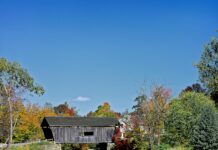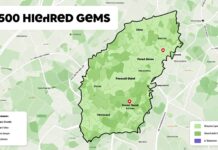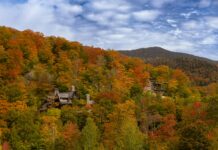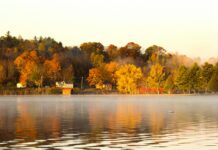Camping in Vermont offers an unparalleled opportunity to discover hidden gems for ultimate outdoor adventure that many travelers overlook. If you’re craving a getaway that combines breathtaking natural beauty with thrilling activities, then Vermont’s lush forests, serene lakes, and rugged mountains are calling your name. But what makes camping in Vermont truly special? It’s not just the well-known spots – it’s finding those secret places where you can unplug, unwind, and reconnect with nature like never before. Are you ready to uncover the best-kept camping secrets in Vermont and elevate your outdoor experience?
When it comes to Vermont camping adventures, the state boasts a diverse range of options that suit every type of camper. Whether you prefer cozy tent camping under the stars, RV sites with modern amenities, or rustic backcountry camping, Vermont has it all. Imagine waking up to the sounds of chirping birds, surrounded by the vibrant colors of the Green Mountains, or spending your evenings by a crackling campfire sharing stories with friends. Plus, with the rise of eco-friendly camping Vermont and family-friendly campgrounds in Vermont, there’s something perfect waiting for you, no matter your style or skill level. Don’t miss out on exploring Vermont’s hidden camping trails where you’ll find solitude away from the crowds and immerse yourself in authentic wilderness.
So why choose Vermont for your next outdoor adventure? Beyond the stunning landscapes and peaceful environment, Vermont offers an abundance of activities like hiking, fishing, kayaking, and wildlife spotting. The question is: are you ready to pack your gear and explore the top secret camping spots in Vermont that promise unforgettable memories? Keep reading to uncover tips, must-visit locations, and insider advice that will transform your camping trip into the ultimate outdoor adventure!
Top 7 Secluded Camping Spots in Vermont for Unmatched Outdoor Adventure
Vermont, with its rolling green mountains, dense forests, and sparkling rivers, is a dream destination for campers and outdoor enthusiasts. Yet, many people only know about the popular campsites near the Green Mountains or Lake Champlain. If you’re craving something quieter, more secluded, and truly off the beaten path, Vermont has hidden spots that offer unmatched outdoor adventure. Camping in Vermont is not just about pitching a tent; it’s about discovering nature’s best-kept secrets. Here’s a guide to the top 7 secluded camping spots in Vermont that you probably never heard of but should definitely try.
1. Big Branch Wilderness Campsites
Located in the northeast kingdom, Big Branch Wilderness is Vermont’s largest wilderness area. This place have very few visitors compared to other parks. Its remote campsites are perfect for those who want to escape the crowd and sleep under a sky filled with stars.
- Primitive sites only, no facilities
- Access by foot or canoe
- Wildlife sightings common, including moose and black bears
- Hiking trails leading to untouched waterfalls
Big Branch offers a raw outdoor experience that feels like stepping back in time. You brings your own water and supplies because no stores nearby.
2. Nulhegan Basin Reserve
Nulhegan Basin is known for its vast wetlands and dense forests, making it a unique spot for nature lovers. The camping area here is very isolated and ideal for bird watchers or anyone who loves quiet mornings.
- Tent camping on designated platforms
- Canoe rentals available nearby for exploring the basin
- Excellent for spotting rare birds like the Bicknell’s thrush
- Few amenities, so prepare ahead
Camping in Vermont at Nulhegan Basin means embracing solitude and the sounds of nature. It’s far from city noise, which some camper might like, others might find it too silent!
3. Woodford State Park – Remote Backcountry Sites
Woodford State Park is popular, but not many people knows about the backcountry sites tucked away in its forest. These spots are miles away from the main campground, offering peace without sacrificing accessibility.
- Backcountry permits required
- Quiet, wooded sites with fire rings
- Near Long Pond for fishing and canoeing
- Trails for hiking and wildlife viewing
If you want a balance between seclusion and convenience, Woodford’s backcountry sites are a great choice. It’s a hidden gem where you can hear only the wind and birds.
4. Groton State Forest – Stillwater Campground
Groton State Forest is one of Vermont’s largest forests. Stillwater Campground is less crowded than other campgrounds in Groton, located near the lake’s edge but still feels private.
- Lakeside tent sites and lean-tos
- Swimming, boating, and fishing opportunities
- Hiking trails connecting to the larger forest area
- Quiet evenings with campfires allowed
Camping here means waking up to the calm lake view and maybe spotting a loon or two. Stillwater has that perfect mix of nature and comfort without the tourist throngs.
5. Camel’s Hump State Park – Hutchins Clearing
Camel’s Hump is one of Vermont’s most iconic peaks, but Hutchins Clearing is a less visited camping spot on its slopes. It’s a small, primitive campsite with spectacular views but requires some hiking to get there.
- Backcountry camping only, no services
- Trail access to summit and surrounding ridges
- Great for experienced hikers and campers
- Stunning sunrise and sunset views
Camping in Vermont’s backcountry like Hutchins Clearing means you needs to be prepared for rugged conditions, but the payoff is worth it. You’ll feel like you own the mountain.
6. Lowell Lake State Park – Secluded Tent Sites
Lowell Lake is a quiet park with several tent-only sites that are often overlooked. Its peaceful waters and dense forest make it ideal for families or solo campers who want less fuss and more nature.
- Tent sites near the lake’s edge
- Canoe and kayak rentals available
- Trails for hiking and wildlife watching
- Picnic areas and fire pits
The park is open seasonally, but when it’s open, you can enjoy campfires and swimming without the crowds seen in bigger parks.
7. Green Mountain National Forest – Wilderness Zones
Green Mountain National Forest covers a huge area with multiple wilderness zones where camping is allowed with few restrictions. These zones are perfect for adventurers who want to explore wild Vermont away from developed campgrounds.
- Dispersed camping permitted with Leave No Trace principles
- Access to hundreds of miles of hiking trails
- Opportunities for fishing, hunting, and wildlife observation
- No potable water or facilities, pack everything you need
The forest’s wilderness zones vary in difficulty and remoteness. Some sites might be a long hike or paddle from parking areas, but they offer a true sense of solitude and self-reliance.
How to Find Hidden Gem Campsites in Vermont’s Wilderness: A Complete Guide
When it comes to camping in Vermont, most people think about the popular spots like the Green Mountain National Forest or the well-known state parks. But truth be told, Vermont is filled with hidden gem campsites that offers a unique and peaceful outdoor adventure away from the crowds. If you want to find these secret spots, this guide will help you discover how to uncover these treasures in the Vermont wilderness. It’s not always easy, but the reward is totally worth it.
Why Vermont is a Camping Paradise
Vermont’s natural landscape is a mix of dense forests, sparkling lakes, rolling hills, and rugged mountains. It’s one of the few states in the New England region that still hold vast areas of relatively untouched wilderness. This means campers can find secluded spots where the only sounds are birds chirping and streams flowing. The state’s long history of conservation efforts has helped protect many natural areas, making it a haven for outdoor enthusiasts.
Historically, Vermont was a land of farmers and loggers, with many old trails and paths still existing from those times. Some of the hidden campsites are located near these historic routes, offering both a camping experience and a glimpse into Vermont’s past. This mix of nature and history makes camping here feel more like an adventure rather than just a weekend trip.
How to Find Hidden Gem Campsites in Vermont’s Wilderness
Finding secret campsites in Vermont requires a bit of effort and know-how. You can’t just drive up and expect to see signs advertising these spots. Instead, here are some tips that can help you uncover those elusive places:
Use Topographic Maps and Trail Guides: Old-fashioned topo maps are incredibly useful. They show elevation changes, water sources, and trails that aren’t always visible on Google Maps or other apps. Look for areas with little or no marked campsites but near water or scenic views.
Talk to Local Hikers and Campers: People who live in Vermont or frequently explore its wilderness often know about lesser-known sites. Visit local outdoor stores or ranger stations and ask for advice. You might get tips on spots that are not widely publicized.
Explore State and National Forest Lands: While popular parks get crowded, many forest lands have dispersed camping allowed. This means you can camp almost anywhere, as long as you follow rules like camping at least 200 feet from trails or water bodies.
Check Online Forums and Social Media Groups: Websites dedicated to Vermont hiking and camping sometimes share hidden gems. Join groups on platforms like Facebook or Reddit, where fellow campers share their favorite secret spots.
Go Off the Beaten Path: Sometimes, just hiking a few extra miles on a lesser-used trail can lead you to a perfect campsite. Look for natural clearings, flat areas, and proximity to water.
Popular Hidden Gem Campsites in Vermont (Example List)
Here’s a small list of some lesser-known but amazing campsites in Vermont’s wilderness:
- Blueberry Lake Campsite (Green Mountain NF): A quiet spot near a small lake, perfect for fishing and swimming.
- Lye Brook Falls Backcountry Site: Located near a beautiful waterfall, it’s remote and peaceful.
- Huntington River Campsite: Secluded riverside camping with plenty of wildlife viewing opportunities.
- Big Branch Wilderness Campsites: Dispersed camping in a pristine wilderness area with no facilities but stunning views.
- Norton Pond Campsite: A small pond surrounded by forest, great for paddling and fishing.
What You Need to Know About Camping Regulations in Vermont
Camping in Vermont requires understanding some rules to protect the environment and ensure everyone’s safety:
- Permits: Many state parks require permits or reservations, but dispersed camping in national forests usually doesn’t. Always check before you go.
- Campfires: In some parts, campfires are allowed only in designated rings or during certain seasons. Vermont can be dry in summer, so fire bans happen.
- Leave No Trace: This principle is essential to keep Vermont’s wilderness clean. Pack out all trash, avoid damaging trees, and camp at least 200 feet away from water to protect riparian zones.
- Wildlife: Vermont is home to black bears and moose. Proper food storage and awareness is important to avoid unwanted animal encounters.
Comparing Popular vs Hidden Gem Campsites in Vermont
| Feature | Popular Campsites | Hidden Gem Campsites |
|---|---|---|
| Crowd Levels | Often crowded, especially on weekends | Usually quiet, few visitors |
| Facilities | Toilets, picnic tables, fire pits | Usually no facilities, primitive camping |
| Accessibility | Easily accessible by car or short hike | Often requires longer hikes or rough roads |
| Scenic Value | Scenic but common views | Unique and often more pristine views |
| Reservation Needed | Usually yes | Usually |
Discover Vermont’s Best-Kept Secret Trails and Campgrounds for Nature Lovers
Vermont, a true New England gem, offers some of the most beautiful and peaceful outdoor escapes for those who love nature and camping. While the Green Mountain State is well known for popular spots like Smugglers’ Notch and Stowe, there are many hidden trails and campgrounds that often go unnoticed by tourists and even locals sometimes. If you are someone who loves to explore beyond the usual and find those secret places where nature feels untouched and quiet, Vermont has plenty to offer. Camping in Vermont: Discover Hidden Gems For Ultimate Outdoor Adventure is not just a catchy phrase, it’s a real invitation to experience the state’s wilderness in a unique and personal way.
Why Vermont Is a Top Destination for Nature Lovers
Vermont is blessed with vast forests, rolling hills, sparkling lakes, and a climate that changes beautifully with every season. It is not just about the famous ski resorts or fall foliage; it’s the countless miles of trails, secluded campsites, and serene natural settings that make it a paradise for outdoor adventurers. The state’s commitment to preserving its natural landscapes means many areas remain unspoiled, perfect for hiking, camping, fishing, and wildlife watching.
Historically, Vermont’s outdoor spaces were used by indigenous peoples and later by settlers who depended on the land for survival. Today, many of these trails and campsites continue to honor that legacy by offering low-impact experiences that keep the wilderness intact. For instance, the Long Trail, one of America’s oldest long-distance hiking trails, stretches over 270 miles through Vermont’s Green Mountains, showing the deep history of outdoor recreation in the area.
Lesser-Known Trails to Explore in Vermont
While Long Trail and Appalachian Trail attract hikers from all over, here are some other trails you probably haven’t heard much about but should definitely try:
Camel’s Hump State Park Trails
Not as crowded as some other spots, these trails offer stunning vistas and challenging hikes. The Burrows Trail, for example, is steep but rewarding with panoramic views at the summit.Northeast Kingdom’s Kingdom Trails
This network of trails is famous among mountain bikers but hikers will find peaceful routes surrounded by dense forest and sparkling streams.Bird Mountain and Mount Horrid
Located in the Green Mountain National Forest, these less-traveled trails provide excellent opportunities for solitude and wildlife spotting.Moss Glen Falls Trail
It’s short and sweet, leading to one of Vermont’s most picturesque waterfalls. Perfect for a family day trip or a quick nature escape.
Hidden Campgrounds That Offer Peace and Privacy
Camping in Vermont doesn’t always mean crowded campgrounds with noisy neighbors. Some secret sites allow you to enjoy the quiet that nature truly provides. Here are a few campgrounds that remain off the radar for many:
Silver Lake State Park
Tucked away in Barnard, this campground has a beautiful lake for swimming and kayaking, but fewer visitors than more popular lakeside parks.Moosalamoo National Recreation Area
This vast area offers dispersed camping sites where you can pitch your tent far from other campers, surrounded by thick forest and peaceful solitude.Little River State Park
Located near Waterbury, this park offers primitive campsites that are less developed but perfect for those wanting a back-to-basics experience.Nulhegan Basin Division
Part of the Silvio O. Conte National Wildlife Refuge, this area allows for some primitive camping while you enjoy bird watching and exploring wetlands.
Practical Tips for Camping in Vermont’s Hidden Gems
Camping in these secret spots requires a bit more preparation than staying at the popular state parks. Here’s some practical advice to keep in mind:
Check permit requirements: Some areas, especially those in national forests or wildlife refuges, require permits or have specific rules about camping locations.
Pack for changing weather: Vermont weather can be unpredictable, especially in the mountains. Always bring layers, rain gear, and warm clothing even in summer.
Practice Leave No Trace: These hidden gems stay beautiful because visitors respect the environment. Pack out all trash, avoid disturbing wildlife, and use established fire rings if fires are allowed.
Bring a map and compass: Cell phone reception might be spotty or non-existent in remote areas. Having physical maps and knowing how to use a compass can be crucial.
Comparing Popular vs. Hidden Spots in Vermont
Here’s a quick comparison to help you decide where you might want to go next time you plan a Vermont outdoor trip:
| Feature | Popular Trails & Campgrounds | Hidden Gems & Secret Trails |
|---|---|---|
| Crowds | Often busy, especially in peak seasons | Usually quiet, fewer visitors |
| Facilities | Developed with restrooms, showers | Primitive or no facilities |
| Accessibility |
Why Vermont Camping Is the Ultimate Adventure for Outdoor Enthusiasts in 2024
Why Vermont Camping Is the Ultimate Adventure for Outdoor Enthusiasts in 2024
If you’re looking for a place where nature still hold its charm and adventure awaits every corner, Vermont camping should be at the top of your list in 2024. Nestled in New England, this state offers a mix of stunning landscapes, from dense forests to tranquil lakes, that make camping experiences unforgettable. Outdoor lovers from all over the country come here not only to relax but to discover hidden gems that you won’t find anywhere else. Camping in Vermont is not just about pitching a tent; it’s a journey into the heart of wilderness that’s waiting to be explored.
Why Vermont Camping Stands Out
Vermont’s natural beauty is unlike many other places in the United States. It combines rugged mountains, crystal-clear waters, and vibrant fall foliage that turns the forests into a kaleidoscope of colors. What makes Vermont camping special, is its accessibility and variety. You can camp near serene lakes, in the midst of mountain trails, or inside charming state parks that offer both rustic and modern amenities.
In 2024, camping in Vermont has been growing in popularity because it offers:
- Diverse camping sites, from backcountry to car camping.
- Abundant wildlife watching opportunities.
- Trails for hiking, biking, and even snowshoeing in colder months.
- Water activities like kayaking, fishing, and swimming.
- Less crowded than other New England states like Massachusetts or Maine.
Discover Hidden Gems For Ultimate Outdoor Adventure
While spots like Green Mountain National Forest are well-known, Vermont has many lesser-known camping gems. These hidden locations provide a more intimate experience with nature — perfect for those who want to escape the hustle and bustle.
Here’s a list of some secret camping spots that outdoor enthusiasts should try:
Norton Campground
Located in the Northeast Kingdom, this site offers primitive camping with access to remote hiking trails. The area is perfect for stargazing, since light pollution is almost nonexistent.Woodford State Park
Although it’s a state park, it remains less busy than others. It features a beautiful pond for swimming and fishing with ample spots to set up tents.Moosalamoo National Recreation Area
Part of the Green Mountain National Forest but less crowded, it has backcountry sites that provide a rustic and authentic camping feel.Lake Willoughby Campground
Known for its dramatic cliffs and clear waters, Lake Willoughby is a popular hiking destination with quiet camping spots nearby.
Vermont Camping: What You Need to Know Before You Go
Camping in Vermont comes with some unique considerations. The weather can be unpredictable, especially in the spring and fall, so being prepared is essential. The state’s camping regulations encourage Leave No Trace principles, which means campers must respect the environment, pack out what they bring in, and preserve the natural beauty for others.
Here’s a quick checklist for Vermont camping preparedness:
- Bring layered clothing to adapt to changing temperatures.
- Prepare for bugs, especially in summer months.
- Check campsite availability and reservation requirements early.
- Know the local wildlife and how to store food safely.
- Have a map or GPS device; cell service can be spotty in remote areas.
Comparing Vermont Camping To Other New England States
If you are wondering how Vermont camping compares to neighboring New England states, here’s a brief comparison:
| Feature | Vermont | New Hampshire | Maine | Massachusetts |
|---|---|---|---|---|
| Scenic Diversity | Mountains, lakes, forests | Mountains, lakes | Coastlines, forests | Forests, coastal areas |
| Crowds | Moderate | Moderate to high | Low to moderate | High |
| Wildlife Experience | Black bears, moose, deer | Moose, black bears, deer | Moose, bears, lynx | Deer, foxes, smaller mammals |
| Camping Options | Backcountry, state parks | National forests, state parks | State parks, national forests | State parks, campgrounds |
| Accessibility | Easy from major cities | Easy | Remote areas more common | Very accessible |
Vermont strikes a nice balance between accessibility and wilderness. It offers enough remoteness to feel wild, but not so isolated that you can’t get help if needed.
Practical Tips for Making the Most of Your Camping Trip in Vermont
Whether you’re a seasoned camper or new to outdoor adventures, Vermont camping in 2024 has something for everyone. To make your trip enjoyable and safe, consider these practical tips:
- Plan your route early: Many popular sites fill up quickly, especially in summer and fall. Booking ahead can save you from last-minute hassles.
- Explore local trails: Vermont’s hiking trails vary from easy stroll
Essential Tips for Exploring Vermont’s Remote Camping Locations Safely and Comfortably
Exploring Vermont’s wilderness is a dream for many outdoor enthusiasts, but when it comes to remote camping locations, things get a bit trickier. Vermont, known for its lush green mountains and tranquil lakes, offers some of the most beautiful hidden gems perfect for camping. However, venturing into these secluded spots require careful preparation and knowledge to stay safe and comfortable. Whether you are a seasoned camper or a newbie, this guide will share essential tips for exploring Vermont’s remote camping locations like a pro.
Why Choose Remote Camping in Vermont?
Vermont’s remote camping spots are far away from crowded campgrounds, offering peaceful solitude and a real chance to connect with nature. These places often lack amenities but make up for it with stunning views, wildlife encounters, and a genuine sense of adventure. The state’s vast forestlands, especially in the Green Mountain National Forest, provide endless opportunity for discovering hidden gems. For example, spots like Big Branch Wilderness or Camel’s Hump State Park are less frequented and offer unique camping experiences.
Historically, Vermont’s wilderness areas have been preserved to protect the state’s natural beauty and biodiversity. Many remote sites remain undeveloped, which means campers must be self-sufficient and respectful of the environment.
Essential Gear for Comfortable Camping in Vermont’s Wilderness
Camping in Vermont’s remote locations mean you don’t have the luxury of nearby stores or facilities. So packing the right gear can make or break your trip.
Here’s a quick checklist of must-have items:
- Durable tent with good rain protection
- Sleeping bag rated for cold temperatures (Vermont nights can be chilly even in summer)
- Portable stove and enough fuel for cooking
- Water filtration system or purification tablets
- Map and compass (GPS devices sometimes fail in dense forests)
- First aid kit with basics and allergy medications
- Extra clothing layers, including waterproof jacket and thermal wear
- Headlamp or flashlight with spare batteries
- Food supply that can withstand being carried over long distances
- Bear-proof food container or hanging system to keep wildlife away
Remember, less is more but don’t skimp on safety and comfort essentials. Vermont’s weather can be unpredictable so always prepare for rain or cold snaps.
How to Stay Safe While Camping in Remote Vermont Spots
Safety is a big concern when going off the beaten path. Here are some practical tips to keep you out of trouble:
- Tell someone your plans: Always inform a friend or family member about where you are going and when you expect to return.
- Check weather forecasts: Vermont’s weather can change quickly, especially in mountain areas. Avoid camping during storms or heavy rain forecasts.
- Know your limits: Remote camping often involves hiking with heavy backpacks. Be honest about your physical condition.
- Practice Leave No Trace principles: Pack out all your garbage and minimize impact on the environment.
- Be wildlife aware: Vermont has black bears and moose; store food properly and keep a safe distance from animals.
- Emergency communication: Carry a whistle, mirror, or satellite phone if possible since cell phones may not work.
Discover Hidden Gems for Ultimate Outdoor Adventure
Vermont has many secret spots that aren’t in every guidebook but worth exploring. Here’s a list of some lesser-known camping locations known for their beauty and seclusion:
- Northeast Kingdom’s Kingdom Trails: Offers quiet campsites surrounded by miles of mountain biking and hiking trails.
- Breadloaf Wilderness: Remote and rugged, this area provides solitude and chances to spot rare wildlife.
- Groton State Forest: A blend of lakes, forests, and mountain views that feel like your own private retreat.
- Silvio O. Conte National Fish and Wildlife Refuge: Camping near pristine rivers with opportunities for fishing and birdwatching.
Each of these areas offers unique outdoor activities beyond camping, like kayaking, fishing, and hiking to scenic overlooks. Compared to popular spots like Mount Mansfield, these remote locations have fewer visitors, making them perfect for those seeking peace and quiet.
Comparing Vermont’s Remote Camping to More Developed Sites
Many campers wonder how remote camping compares to staying in developed Vermont campgrounds. Here’s a quick comparison table highlighting some key differences:
| Feature | Remote Camping | Developed Campgrounds |
|---|---|---|
| Amenities | None or minimal | Restrooms, potable water, picnic tables |
| Privacy | High | Often crowded, less privacy |
| Difficulty | Moderate to challenging | Easy to moderate |
| Wildlife Encounters | More frequent | Less common |
| Access | Often require hiking or 4WD vehicles | Accessible by car |
| Cost | Usually free or low cost | Fees apply |
If you prefer convenience, a developed campground might suit you better, but for authentic wilderness experience, remote
Conclusion
Camping in Vermont offers an unparalleled opportunity to immerse yourself in nature’s beauty, from the lush forests and scenic mountains to the tranquil lakes and rivers. Whether you prefer rustic tent camping, cozy cabins, or well-equipped campgrounds, Vermont provides diverse options to suit every adventurer’s needs. Throughout the seasons, the state’s vibrant foliage, abundant wildlife, and peaceful trails create a perfect backdrop for hiking, fishing, and stargazing. Additionally, Vermont’s welcoming communities and rich local culture add a unique charm to your outdoor experience. Embracing sustainable camping practices ensures that these natural treasures remain pristine for future visitors. If you’re seeking a refreshing escape that combines adventure, relaxation, and breathtaking landscapes, Vermont is truly a camper’s paradise. Pack your gear, plan your trip, and discover the magic of camping in Vermont—your next unforgettable outdoor adventure awaits!










